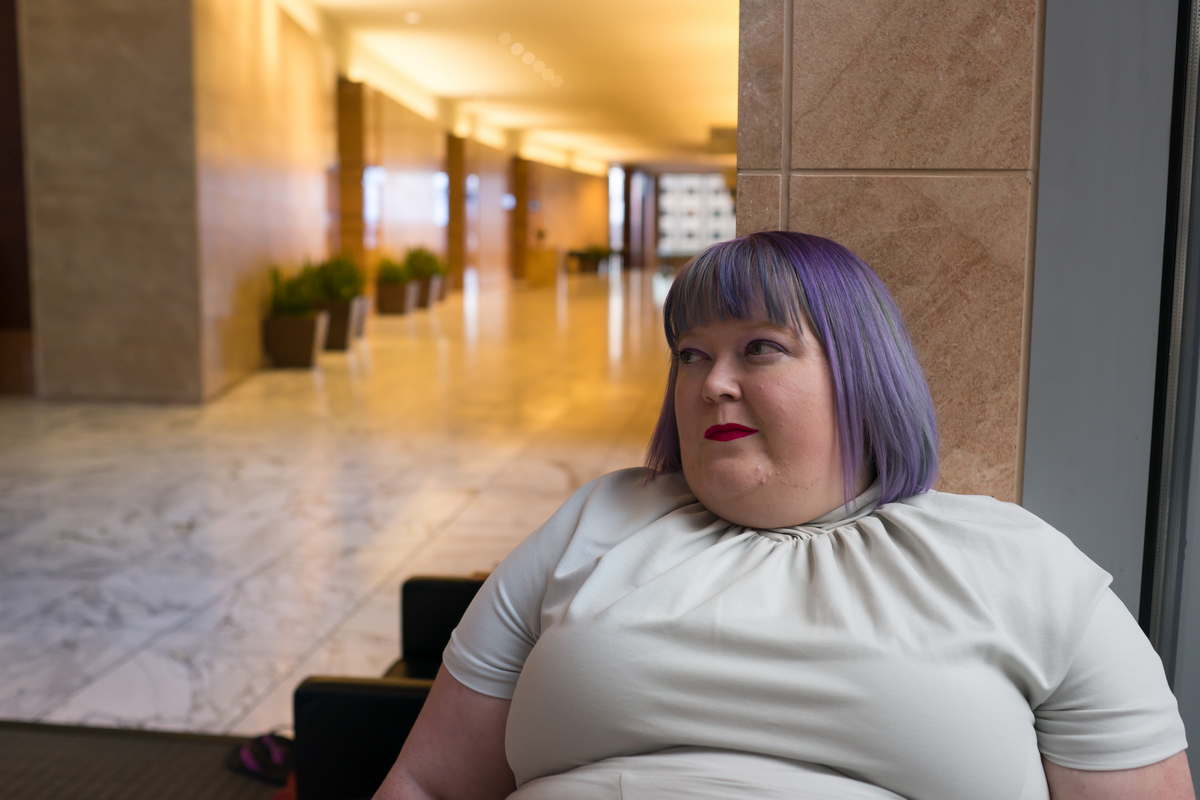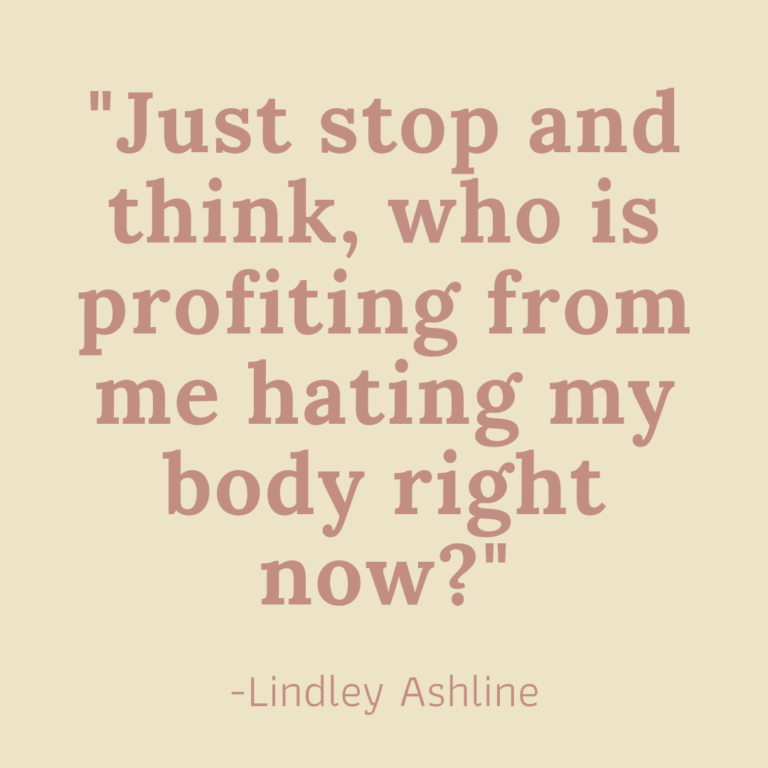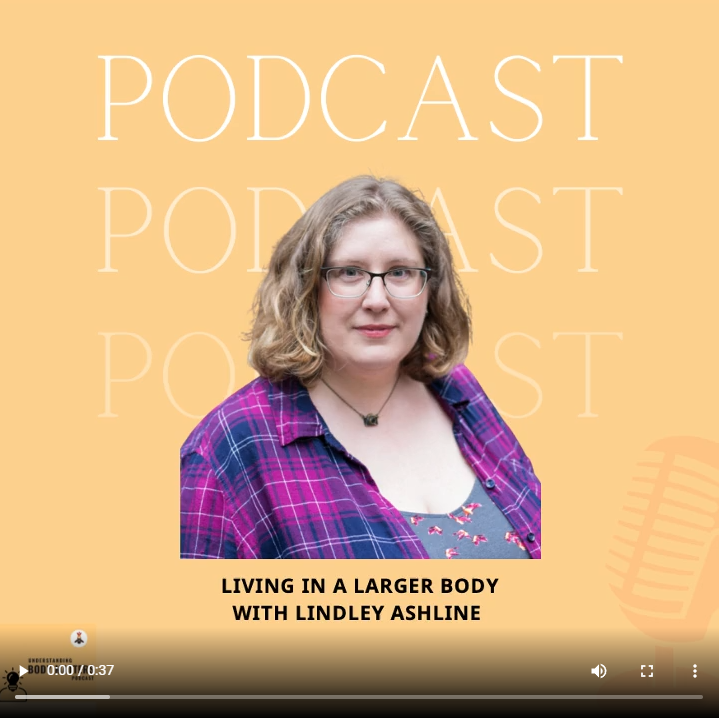Ask Lindley: How do I deal with fatphobia and diet talk at work?
Image description: A fat white woman with purple hair, red lipstick and a gray short-sleeved dress is shown from the bust up. She is sitting in the lobby of a large corporate office building. An empty hallway with marble floors and large plants in planters stretches out behind her. End image description.
This post may contain affiliate links, which allow us to earn commissions on products we recommend. All opinions are our own.
Reader E. asks, “Dear Lindley, I’m working on accepting my body, but it’s so hard to sit at work and have to listen to diet talk all the time. I can tell that I’m being treated differently because my body doesn’t fit in with everyone else’s. And when we’re required to wear shirts with the company logo, there’s never one in my size and I either have to squeeze into one that’s way too small or be the odd one out. How can I deal with this?”
Dear E., so much sympathy from me to you. It sucks to have your professional life affected by your body size, and it sucks to have to deal with diet talk and fatphobia in an environment where setting and holding boundaries can also affect your career. As I answer this, I want to note that though I spent 10+ years in office environments, I currently run my own business and am not subject to this kind of of situation, which is a privilege.
When you live in a fat body, many of the people around you — who have been trained by diet culture to hold these beliefs — will assume that if you just knew about your own fatness (and all the negative qualities assigned to it) you’d immediately reform, shed those negative qualities to become a better person, and in the process, become worthy, as expressed in the flesh through thinness.
Diet culture has also trained people in non-fat bodies that it is the right thing to do — nay, their duty — to lead the fat people around them to righteousness. This often takes the form of trying to “save” us, whether subtly or directly. If you think I’m calling diet culture a religion, you are absolutely right.
These days (well, pre-COVID), I occasionally take on part-time corporate contracts that do require me to spend some time sitting in offices. The last time I did, I got a pointed reminder of what it’s like to live in a world where you’re subjected to in-person weight stigma and/or diet talk every day. In fact, I had my own personal thin savior, in the form of the woman in the next cubicle over, who’d recently had her first child. For the first time in her life, this woman had a tiny belly pooch when she slouched, and it was causing her entire self-image to crumble. To her, this meant that she was no longer thin, and suddenly she felt no longer “good” or worthy.
Another component of diet culture is that enforcing it on the people around you gives you power. Not only does enforcing diet culture — in the form of fatphobia, weight stigma, diet talk, and other forms of discrimination and body-related racism — give us the immediate rush of complying with dominant systems of power, it:
- Allows us to claim all the positive traits assigned to thinness (worth, dignity, willpower, hard work, athleticism, making good choices, and so on)
- Allows us to compare ourselves positively to others who, as shown in their bodies, don’t possess those qualities
- Allows us to feel like we are reclaiming power by wielding a weapon against other people
It’s a toxic, corrosive power that destroys us both personally and culturally, but in the moment there are real rewards to wielding thinness as a weapon. Keep that in mind as you observe fatphobia and diet talk in the wild. Even when people who are not fat perform diet talk between themselves, there is always compliance with systems of power.
(Diet talk is extra corrosive, because it it encourages us to say and internalize negative things about our bodies while also being performatively compliant with a toxic system in a way that simultaneously oppresses the people around us. When you say, “Oh, your thighs are fine, but MINE are GIGANTIC,” you are both showing off your superior commitment to diet culture AND oppressing yourself. Neat trick!)
My recently-pregnant coworker, when confronted with a very fat body sitting right next to her, chose to wield diet culture as a weapon.
It started with water, in a nice glass reusable bottle, with some sliced lemon floating in it. My coworker, who I’ll name Alice, would randomly turn to me during the day and brandish that water bottle at me. “My doctor told me to drink lemon water,” she’d announce, “and it helped me lose all the baby weight. You should try it.”
At other times, she’d turn to me out of the blue, slouch way down in her chair so that she had the tiniest belly roll, and interrupt my work to tell me how distressed she was about how she now had a “huge” belly. (While trying not to stare in horrified fascination at my own rather prominent belly.)
When those slightly more subtle tactics didn’t produce the expected results of my immediate contrition and vows to be a better and thinner person, she immediately moved to the big guns. Since I don’t normally work downtown, I was enjoying all the delightful food options within walking distance, and had developed a deep fondness for a local piroshki place. Alice happened to walk into one of the large elevators in that building one day along with me and six or seven other people I didn’t know, and since it was around lunchtime, she of course asked where I was headed.
When I told her, she physically backed a step away from me, pushing her back into the elevator wall as if suddenly unable to bear being close to me, and said “Do you know how many carbs are in those?” in a horrified, shrill voice that echoed off the elevator walls.
Suddenly I was the center of attention in a dead-silent elevator.
I can’t even remember what I said in reply. Probably something soothing and compliant. Unsurprisingly, Alice and I didn’t keep in touch when we both moved on from our respective contracts. I hope she’s since found a measure of peace with herself and her body.
That was a few years ago, and I’ve since done quite a bit of work with a therapist on setting and holding boundaries, so my responses might be different today. Or not: My first responsibility is to care and protect myself (and, in the workplace, my career).
The first thing you need to know, internalize and believe is that fatphobia in the workplace is not your fault, and it’s not your problem to fix. You are not the Appointed Fat Activist of This Company by virtue of being employed there and living in a fat body. You are not inherently responsible for fixing it. If you choose to try to make change at work, that’s great, but your job is to survive in a culture that would prefer you didn’t exist, not to try to fix your workplace from the bottom up.
Survival is your job. Compensating for and/or solving fatphobia is not. Release that feeling of responsibility to your company and your co-workers, because it is inherently their responsibility not to oppress or discriminate against you.
And that’s the reason I’ve told you this story: It is possible to reclaim some of your own power when dealing with fatphobia, weight stigma and discrimination at work by choosing how you respond and caring for yourself as needed. Here are a few strategies, plus some resources.
Dealing with systemic weight stigma in the workplace
Systemic weight stigma is — surprise! — about systems and infrastructure. You can see systemic discrimination in action in too-small office chairs, team-building trips to destinations that don’t accommodate bodies of every size (think roller coasters at theme parks) and company logo shirts that don’t come in sizes that fit every employee.
This kind of weight stigma can be a bit easier to deal with emotionally because most of the time, it’s not aimed at you personally. The chairs just happen to be too small, and that conference room just happens to be too narrow for you to maneuver through when people are sitting at the table, and those shirts just happen not to fit anyone over a 2X.
Don’t get me wrong; at some point, actual human being made discriminatory decisions that led to these systems and infrastructure excluding you. That’s an issue. But again, most of the time these decisions weren’t made with you specifically in mind.
That said, those decisions were made, and now they affect you. Here are some ways you might choose to respond.
See the system in action. One way you can choose to react to these situations is to take a broader view and realize that these are parts of a racist, fatphobic, classist system that was created specifically to force some bodies out of public life. Recognizing the components of this system in the moment can help us separate emotionally from the issue and place it in its proper context.
It can also help us place the blame where it belongs. If I can’t move around a conference room when it’s occupied, that’s the fault of the people who designed that room without considering all the people who might use it. It’s not the fault of my body at all.
Advocate for change. I’m a little hesitant to include this because it has become such a victim-blaming cliche. Don’t like the way you’re treated? Stand up for yourself! Tell them to treat you better! That won’t lead to additional consequences at all. (Said with heavy sarcasm.)
If you have the social capital at work, and if you choose to spend it in this area, and if you want to, you can choose to be a force for change in your workplace by pushing for change. That might look like asking your company to provide shirts that fit everyone, or asking your manager for a chair that fits you, or any of thousand other acts. (A new acquaintance of mine just created some change by emailing a high-profile figure from her company, who’d published a fatphobic tweet, and educating him about weight stigma and health at every size.)
But once again, you are not responsible for producing change and it’s not a moral obligation. You know your situation best. Trust yourself.
Dealing with interpersonal fatphobia in the workplace
Interpersonal fatphobia feels much more immediate and personal because it is, in fact, aimed at you personally. This is diet talk, mean comments, being excluded from events or swag or apparel, losing out on promotions or raises, loud elevator comments about your lunch choices. Here are some ways you might respond:
See the systems. Just like with systemic discrimination, it may help to step back and view your interactions with coworkers from a systemic perspective. Once you see others as people navigating diet culture and making choices (often subconsciously) within that system, it becomes easier to separate yourself from it. In my example with Alice above, being able to see how she was weaponizing her thinness against me in order to reassure herself that she herself was still good and worthy didn’t make the behavior any less infuriating in the moment — or excuse it — but it did help me identify what was really going on and assign some of the blame where it belongs: on a system that pushes people, especially women, to do awful things to each other in the name of “worthiness.”
For another example: I get a lot of nasty comments on my Instagram when I talk about thin privilege that involve a specific, unusual phrase (“That’s not thin privilege, it’s fat consequence”). Once I realized all of those people were coming my way because they’re fans of a fitness “influencer” who’s horrifically fatphobic and likes to use that phrase “fat consequence,” I was able to see the pattern and how it upholds the system.
(And to start seeing those comments, no matter how awful they were, as hilarious, because how pathetic must you be for your hobby to be picking on people because some dude on the internet told you to?)
Leave. Like advocating for change, this is not a solution I put forth lightly — particularly because many forms of fatphobia are simply present at almost every workplace. But it may be an option you choose to pursue.
Alison at the wonderful Ask a Manager blog (half work advice, half dishy office stories) often says that you have three choices in how to respond to workplace issues:
- Address it directly
- Put up with it
- Quit
You are the only one who can decide on the right choice, but you have choices. Keep that in mind.
Learn to set boundaries. Boundaries aren’t just for personal relationships! You are allowed to set boundaries around what you will and won’t discuss or accept from others in the workplaces, too. (With the recognition that boundary-setting at work is different than in your personal life, and carries professional ramifications.)
I’m going to throw this one over to two experts: Alison, who I mentioned just a moment ago, and fat activist and athlete Ragen Chastain. Alison suggests in her piece “My Office Is Obsessed With Diets and Weight” that you might consider:
- Pointing out to your boss that a diet-obsessed office isn’t a welcoming environment for people in all body sizes (plus people who have eating disorders, plus people who just love respecting bodies in the first place)
- Talking with individual coworkers about it and inviting them to help redirect or avoid diet talk
- Setting a boundary right in the moment with a short and simple, “Wow.” And then walking away.
Though Alison is fantastic and so is her advice, she also lives in a smaller body, which means that her advice isn’t necessarily coming from someone with lived experience of facing fatphobia in the moment. Ragen, who does live in a fat body, says:
“Regardless, I don’t know about you but I don’t give a crap why my co-worker is or isn’t eating something, what morality they’ve assigned to that choice or why. Much the same way that I don’t want to know if the cream that their doctor prescribed is making that rash any better. Boundaries people, boundaries. Can you imagine if we talked about every personal decision the way we talk about food choices ‘I have to poo but I don’t like to do it in public so I’m hoping to make it home before I really have to go.’ Why are you telling me this? What can I do to make you stop?”
– Ragen Chastain
In her post “Dealing with Diet Talk” Ragen covers four more ways you might choose to respond. I won’t steal her thunder, so click on through and read them.
Process your feelings. No matter the situation, facing fatphobia in your job can leave you feeling drained, hurt, angry, sad, frustrated and/or helpless. It’s important to sit with and process your feelings, with professional help if needed. I like this blog post from Peaceful Eating on how to sit with your feelings as a start.
More resources, choices and tools for dealing with systemic and interpersonal weight stigma and other marginalizations at work:
- Weight Stigma in the Workplace at Food Psych
- Superfat In The Workplace
- Fat Girl Working: A Guide to Overcoming Obstacles in the Workplace
- Weight Discrimination In The Workplace: The Troubling Lack Of Plus-Sized CEOs
- 7 Ways To Make Your Workplace Safer For Trans People
- Help! I Think My Co-Worker’s Weight Is Impeding Her Career. Should I Say Something?
- Fatphobia in the workplace can be career limiting and psychologically harmful
- Why We Need Older Women in the Workplace
- Workplace Wellness – An Exercise in Frustration
- Your workplace wellness program probably isn’t making you healthier
- Stop touting the crazy hours you work. It helps no one.
- Why We Should Take Weight Discrimination Seriously As a Workers’ Rights Issue
- A Lack of Confidence Isn’t What’s Holding Back Working Women

Let’s dig deep. Every Monday, I send out my Body Liberation Guide, a thoughtful email jam-packed with resources for changing the way you see your own body and the bodies you see around you. And it’s free. Let’s change the world together.
Hi there! I'm Lindley. I create artwork that celebrates the unique beauty of bodies that fall outside conventional "beauty" standards at Body Liberation Photography. I'm also the creator of Body Liberation Stock and the Body Love Shop, a curated central resource for body-friendly artwork and products. Find all my work here at bodyliberationphotos.com.








